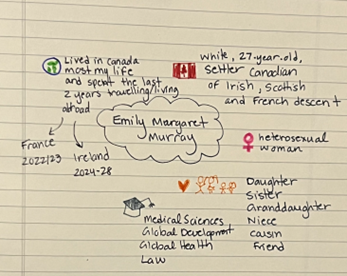A Day in the Life of a Researcher: Ocean Incubator Network Edition
Reflecting on Positionality and Purpose in Our Research
Prepared by Emily Murray
The primary goal of the OIN is to develop integrated research and education programs with the primary objective of accelerating Ocean Literacy (OL) to advance the attainment of SDG 4 Quality Education and Lifelong Learning for All, SDG 5 Gender Equality, and SDG 14 Life Below Water, especially throughout Arctic communities.
An important part of the research process, especially when working alongside vulnerable populations (human and non-human) and the environment, is positionality. The practice of recognizing and being continuously aware of who we are and what we bring into our research allows us to make it clear to the reader, students, or anyone how our being influences our work. For example, many scholars working among and with Indigenous communities will start any publication or presentation with an introduction to who they are (e.g., My name is Emily and I am a white settler researcher of European descent and I have lived in Canada the majority of my life). Stating our positionality at the beginning of our work and being aware of how we define ourselves within the academic and research sphere can help to make our work more ethical, just, and purpose-driven.
Positionality is a big theme in participatory action research (PAR) and place-based research; however, it has the potential to add great value to any discipline or type of research. In research and education on/with the natural environment, the reflexive practice of defining our positionality aligns with an ethics of care and responsibility towards nature. Positionality goes beyond who we are in relation to each other, but also the environment (e.g. the Ocean).
Open-Access Resources on positionality:
Bourke, B. (2014). Positionality: Reflecting on the Research Process. The Qualitative Report, 19(33),
1-9.
Elicor, P. P. E. (2022). Positionality and Ethics in Doing Research. The Multidisciplinary Research
Journal, 2(1): 1-17.
Kitagawa, K. (2023). Researcher Positionality in Participatory Action Research for Climate Justice
in Indigenous Communities. International Journal of Qualitative Methods, 22: 1-15.
Horlings, L. G., Nieto-Romero, M., Pisters, S., & Soini, K. (2020). Operationalising transformative
sustainability science through place-based research: the role of researchers. Sustainability Science, 15: 467-484.
UCLA Library. (2021). “Positionality & Research: How our Identities Shape Inquiry.” Available at
https://www.youtube.com/watch?v=fTHFud7fr8c&ab_channel=UCLALibrary
UCLA Library. (2021). “Positionality & Research: Awareness Strategies.” Available at
https://www.youtube.com/watch?v=ORrF7cKktrQ&ab_channel=UCLALibrary
OIN and Positionality
As members of the OIN, it is important to reflect on our research and how we: (1) define ourselves within the research; (2) relate to and connect with nature through our research and (3) position ourselves among the communities in which are connected to through research (other researchers, grassroots movements, civil society, etc.).
The two core pillars of the upcoming workshop in May 2024 are (1) Connecting with Each Other and (2) Connecting with Nature. In order to get our minds and hearts in the right spaces, we will partake in self-reflective exercises to better understand who we are within the research process—our positionality. Furthermore, we will step beyond the typical exercise of positionality (human-centered) to also involve nature and how our work is impacted by nature and how our work impacts nature.
In working together and with other stakeholders to create pilot education and research materials connected to Ocean Literacy, it is our duty as researchers and advocates to become the best versions of ourselves so that our research can have a positive impact on society. The practice of recognizing our positionality is connected to strengthening our emotional intelligence.
In the coming months, we will reflect and journal on who we are and how this impacts our research. This will be a live document and will be updated as we go, and will act as a pilot module for teaching researcher positionality.
Activity #1
- - Do a little research on “positionality”
- - TIP 💡check out the resources on Page 1
- - Watch the 2 videos listed on page 1 and reflect on all the different pieces that make up you (gender, race/ethnicity, etc.)
- - Open a fresh Word Document or a new page in your journal and write down/draw who you are (p.s. It doesn’t have to be well organized, just put something down)
Prepare 1-2 lines to introduce yourself during our next OIN coffee catch-up meeting and then we will go from there!

The map on positionality by Emily Murray, 2024